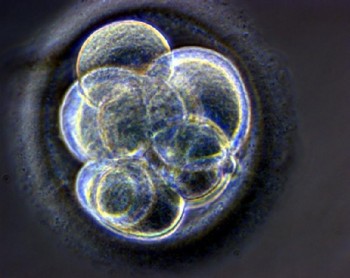Christian programme matches discarded adopted embryos with donor parents
Unwanted human embryos adopted by couples who could not conceive and born into their new family are now being reconnected with their biological parents.
Nightlight Christian Adoptions began pairing discarded embryos in fertility clinics with families in 1997.
This summer Snowflakes, the agency's foetus-matching spin off, will celebrate its 20th anniversary by reconnecting recipient parents and their children with embryo providers.

A new study has examined what both sides can expect, suggesting most of the reunions are largely positive.
Family building using embryo adoption examined 25 providers and 40 recipients and concluded that while 'contact arrangements varied considerably', they were 'generally positively' although 'some challenges were acknowledged'.
Published in Human Reproduction by Oxford Academic it read: 'All families were open with their children about how they were conceived and early contact between recipients and providers (frequently before birth) was valued.
'On the whole, participants were happy with the amount and type of contact they had, and where the current contact did not involve the children, it was seen as a way of keeping the channels open for future contact when the children were older.
'Participants often portrayed the opportunities for contact as being in the best interests of the child.'
Lead author Lucy Frith, a bioethicist at the University of Liverpool in England, said: 'Some of them created these amazing families. Then, of course, these are like all human relationships, some you maintain and flourish, and others don't.'
Frith and her colleagues found that embryo providers and recipients who were in touch with one another and their children generally perceived the contact as positive.
'The contact helped alleviate their potential misgivings,' Frith said in a phone interview with Reuters.
'Different families will want to approach it in different ways,' she said. 'It's part of the evolution of seeing reproductive technologies of creating families and families having biographies, rather than just a medical technique.'
Concerns about who would act as the parents turned out to be more imagined than real, she said, with embryo providers more like distant relatives, extended family they see at most a few times a year
'Everyone saw the recipients as the parents.
'The recipients were the parents, and the donors were involved as the recipients wanted them to be involved.'
One recipient mother wrote: 'The only negative I can think of is imaginary, at this point at least, and that is a worry over being scrutinized or criticized by the genetic parent.'
One study participant wrote of the child born of the embryo she provided: 'We plan to be a part of her life forever. Not knowing leaves too much for the mind to ponder.'
A recipient mother who was initially reluctant to be in touch with the provider couple described their relationship 'a huge blessing.'
She wrote: 'Not only were we given our daughter, but a whole family too, two families actually, or one big family!'
Additional reporting by Reuters.











